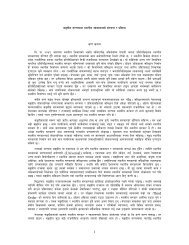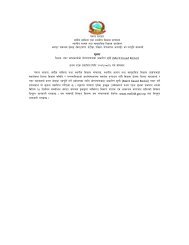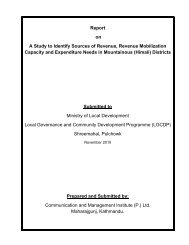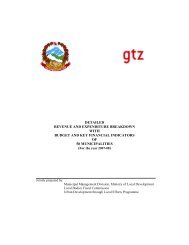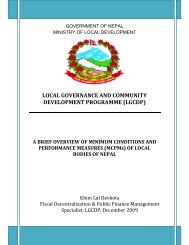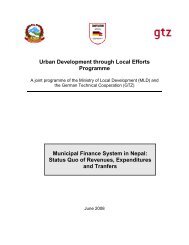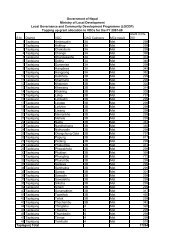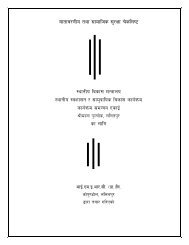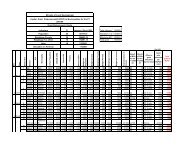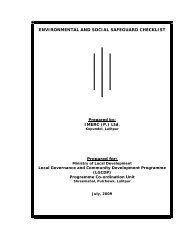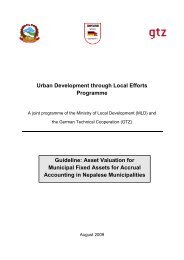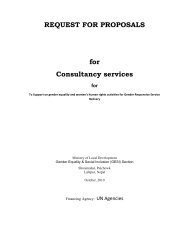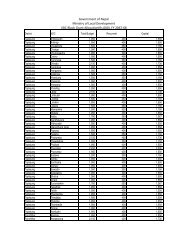GTZ Report on Accrual Accounting Status Quo - LGCDP
GTZ Report on Accrual Accounting Status Quo - LGCDP
GTZ Report on Accrual Accounting Status Quo - LGCDP
You also want an ePaper? Increase the reach of your titles
YUMPU automatically turns print PDFs into web optimized ePapers that Google loves.
Cash <strong>Accounting</strong> vs. <strong>Accrual</strong> <strong>Accounting</strong> 2<br />
02. Cash <strong>Accounting</strong> vs. <strong>Accrual</strong> <strong>Accounting</strong><br />
2.1. Definiti<strong>on</strong> and comparis<strong>on</strong> of the Cash <strong>Accounting</strong> System and the<br />
<strong>Accrual</strong> <strong>Accounting</strong> System<br />
Definiti<strong>on</strong> of Cash <strong>Accounting</strong><br />
The cash accounting system primarily focuses <strong>on</strong> the inflow and outflow of cash transacti<strong>on</strong>s within <strong>on</strong>e period. That is<br />
why it <strong>on</strong>ly knows two accounts in its pure form – the cash inflow account (cash receipts) and the cash outflow account<br />
(cash payments) and therefore can <strong>on</strong>ly produce cash flow statements that cover cash inflow, cash outflow as well as<br />
opening and closing cash balances. Transacti<strong>on</strong>s are <strong>on</strong>ly recorded when the m<strong>on</strong>ey for revenues actually is received<br />
and <strong>on</strong> the other side expenditures are <strong>on</strong>ly recorded when they are actually paid. This is related to the development of<br />
accounting systems in the past. In former times there was no major time difference between the receipt and payment<br />
of a certain good, which is why it was not necessary to develop separate accounts in order to reflect this time gap<br />
through receivables or payables or whatsoever. This has the effect that cash accounting is blind towards future<br />
revenues or expenditures until they are recorded in the cash accounts. Besides that the cash accounting system does<br />
not recognize the interlinkage between the source and the applicati<strong>on</strong> of funds, since the sums normally simply<br />
“appear” in the cash inflow or cash outflow account without a c<strong>on</strong>necti<strong>on</strong>. Therefore <strong>on</strong>e can not track down the linkage<br />
between the m<strong>on</strong>ey (e.g. taxes or fees) that was used to achieve a certain outcome (e.g. a new bridge). For the same<br />
reas<strong>on</strong> <strong>on</strong>e can not c<strong>on</strong>nect received cash to the total cash to be received (e.g. in tax management). Furthermore the<br />
cash accounting focuses <strong>on</strong>ly <strong>on</strong> cash and therefore doesn’t reflect the status, value or wear and tear of assets and<br />
resources and therefore has no incentive for planned, strategic maintenance or reinvestment. Thus it is possible that a<br />
municipality lives from their “asset substance” e.g. a street by not acknowledging that assets are devaluing when being<br />
used. Therefore maintenance of and reinvestments into assets are not specifically planned in cash accounting or cash<br />
budgeting and because of this, necessary “sudden” maintenance or the reinvestment into an asset at risk (e.g. a bridge<br />
with cracks) might not be affordable for municipalities in a current fiscal situati<strong>on</strong>. Cash <strong>Accounting</strong> is the dominant<br />
public sector accounting system.<br />
Definiti<strong>on</strong> of <strong>Accrual</strong> <strong>Accounting</strong><br />
On top of the known cash transacti<strong>on</strong> accounts from the cash based accounting system, the accrual accounting<br />
system knows multiple accounts, like receivables, payables, asset accounts, depreciati<strong>on</strong>s to be made <strong>on</strong> assets.<br />
Therefore it can provide a complete financial overview of e.g. a municipality.<br />
It displays full financial informati<strong>on</strong> <strong>on</strong> all cash transacti<strong>on</strong>s, assets, resources, resource c<strong>on</strong>sumpti<strong>on</strong>, true costs,<br />
arrears and current as well as future liabilities and revenues. Moreover it recognizes ec<strong>on</strong>omic events and transacti<strong>on</strong>s



